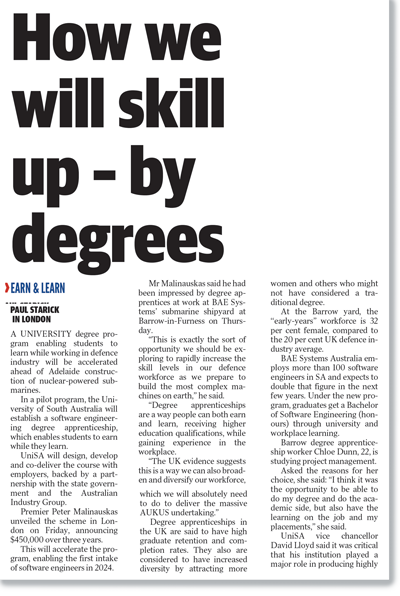Degree apprenticeships fast-tracked for SA defence jobs ahead of AUKUS construction
 TECHNOLOGY AND ENGINEERING
TECHNOLOGY AND ENGINEERINGUniSA is partnering with the South Australian Government, the defence industry and the Australian Industry Group (Ai Group) to fast-track a university degree apprenticeship pilot program for the growing defence sector, ahead of the construction of nuclear-powered AUKUS submarines commencing in South Australia.
 The Advertiser 18 March 2023
The Advertiser 18 March 2023The State Government has committed $450,000 over three years to support the establishment of a software engineering degree apprenticeship that will enable students to earn while they learn and prepare for defence careers.
UniSA will design, develop and co-deliver the course with host employers, design and implement host employer supervisor training plans, and provide ongoing support for host employers and apprentices throughout the program.
UniSA Vice Chancellor Professor David Lloyd says the University has always worked closely with industry and government to respond to changing workplace needs.
“With South Australia poised to deliver the single biggest defence project in our country’s history – the construction of nuclear-powered submarines – it is critical that UniSA plays a major role in producing highly-skilled graduates that meet defence requirements,” Prof Lloyd says.
Degree apprenticeships for the defence industry are currently delivered in the United Kingdom, with high graduate retention and completion.
They have also increased diversity, attracting more women and candidates who may not have considered a traditional degree pathway.
Premier Peter Malinauskas says degree apprenticeships are a way people can both earn and learn, receiving higher education qualifications, while gaining experience in the workplace.
Malinauskas says he’d like to see degree apprenticeships similar to those in place at BAE Systems’s submarine shipyard in Barrow-in-Furness in the UK.
“This is exactly the sort of opportunity we should be exploring to rapidly increase the skill levels in our defence workforce as we prepare to build the most complex machines on earth,” Malinauskas says.
“The UK evidence suggests this is a way we can also broaden and diversify our workforce, which we will absolutely need to do to deliver the massive AUKUS undertaking.”
Based on the UK model, Ai Group – which runs the Defence Council – and the local defence industry have begun working with UniSA to develop the software engineering degree apprenticeship to be delivered in South Australia.
The South Australian Government’s contribution will enable the pilot to progress quickly, with the goal to enable the first intake of software engineering apprentices to commence in 2024.
The South Australian Head of Ai Group Jodie van Deventer says degree-level apprenticeships can help ensure university graduates gain the additional skills they need to be productive in a workplace and can also provide employers early access to future employees.
“The degree apprenticeship model opens opportunities for a professional career to people who may not have previously considered full-time study,” van Deventer says. “This can grow the number of university-qualified people employed in the workforce.”
BAE Systems Australia employs more than 100 software engineers in South Australia and will be required to double that figure in the next few years due to existing planned work.
Under the new program, graduates would obtain a Bachelor of Software Engineering (Honours) through a combination of university and workplace learning over the duration of the degree.
Strong support for the degree apprenticeship model exists within the wider defence industry, with benefits including consistent on-the-job supervision, workplace assessment and a customised curriculum to suit workplace requirements.
The initiative will enable the degree apprenticeship model to be developed and applied to other relevant defence related disciplines such as electrical and mechanical engineering.
Other Stories
- Fitspiration influencers: more talk than walk when it comes to body image
- Eye spy: building inspectors may soon be shooting laser beams, saving the construction industry millions of dollars
- Out of the shadows and into the Light: UniSA reopens historic haunt as new Enterprise Hub
- Has GPT-4 really passed the startling threshold of human-level artificial intelligence? Well, it depends
- From the Vice Chancellor
- Achievements and Announcements
- Degree apprenticeships fast-tracked for SA defence jobs ahead of AUKUS construction
- $5 million for Aboriginal-led team to improve maternal and child health research
- Solar industry feeling the heat over disposal of 80 million panels
- In Pictures: Official opening for UniSA’s Enterprise Hub
- The latest books from UniSA researchers



